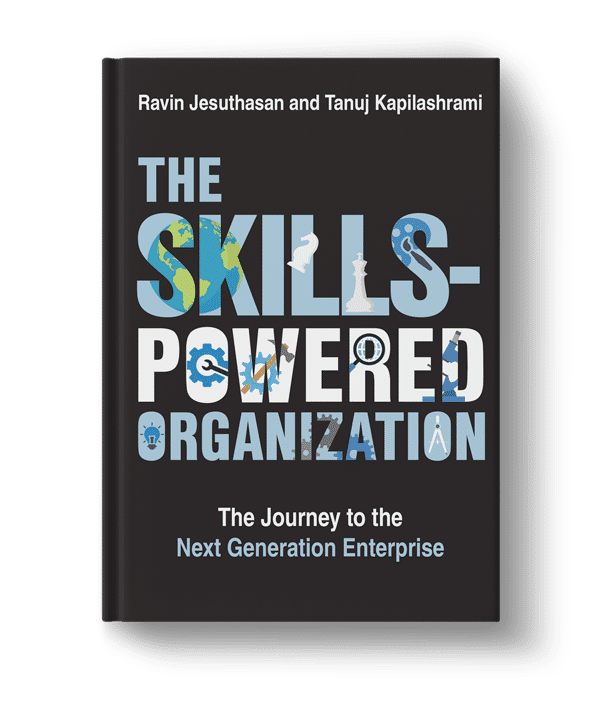Virtual Event

The world of work is moving with greater velocity and volatility. Companies need to respond this change with smaller building blocks to resource work with greater precision and agility. As a result, we are seeing jobs give way to skills as the currency of work.
In The Skills-Powered Organization: The Journey to the Next Generation Enterprise (MIT Press, 2024), authors Ravin Jesuthasan and Tanuj Kapilashrami look at how companies are reinventing themselves to be skills-powered; how they are adopting new organisational capabilities, such as work design and AI-driven resourcing; and transforming value for customers.
The following is an edited excerpt.
The Evolution to a Skills-Powered Organization: A Quick Retrospective
The work construct most of us have today is about 140 years old. It is at least as old as the Second Industrial Revolution (1870–1930), when employers aggregated disparate activities into jobs, jobs into job families, and job families into functions. With its relentless pursuit of efficiency, Frederick Taylor’s scientific management method (his book, The Principles of Scientific Management from 1909, was named the most influential book of the twentieth century by the Academy of Management) was widely embraced. His approach ensured that workers would know exactly what was expected of them and managers would know exactly how much should be produced in an era where capabilities were primarily built and owned by individual companies.
The “one-to-one” relationship between a person and a position was thus born with much of the organization’s control systems: finance, HR, and technology, grounded in the notion of the job as the currency of work. Talent was attracted, engaged, and retained with one- size- fits- most approaches that only varied as one ascended the organizational hierarchy (i.e., moving from a “small job” to a “bigger job”). The technology of this era significantly reduced inequality as traditional “craft-based activities,” which required high skill premiums and years of expertise and were increasingly automated. This resulted in the democratization of opportunity as skills premiums were reduced, enabling those with “lesser” skills to engage with well-paying work.
In the Third Industrial Revolution (1955–2005), this carefully constructed value chain started to unravel. The democratization of information enabled companies to understand the cost, capabilities, and risks of working elsewhere. This led to the outsourcing movement as entire jobs and processes were “lifted and shifted” in pursuit of labor arbitrage and greater agility for an increasingly volatile world. In this era, as capabilities were increasingly shared at lower marginal costs, the job continued to serve as the primary currency for work. The end of this era saw significant advances in computers but also resulted in greater inequality. Research by David Autor and others observed significant “job polarization” during this time. Computers increased wages and opportunities for high-income, college-educated workers—substituting a range of highly rules-based work in manufacturing and offices that had once provided solid opportunities for people without a college degree.
In the Fourth Industrial Revolution (2005–present), advances in cloud- based computing, mobile technology, and AI heralded the democratization of work—our growing ability to increasingly decouple work from its traditional confines of space, time, and structure. As companies increasingly turned to platform-based business models that allowed them to engage with talent on demand, the concept of gig work was born. This started the move toward skills serving as the currency of work instead of jobs.
In this era, capabilities are increasingly rented when needed, at virtually zero fixed cost. The inequality in wages and opportunities that started in the 1990s has been exacerbated in this era. Repetitive, rules-based work has diminished, and with the augmentation of technology, an even greater premium has been placed on reasoning, decision-making, abstract thinking, problem-solving, and creativity.
As we approach a post-Fourth Industrial Revolution world, we see that the demands of the agile movement, the recent advances in generative AI, the need for greater flexibility in business models, and increased eco- nomic volatility further accelerate the need for skills as the currency of work to ensure the rapid (re)deployment of talent to changing demands for work. The World Economic Forum’s Future of Jobs Report 2023 suggested that 60 percent of workers will require additional training by 2027—with the biggest priority being analytical thinking. Technology-related roles dominated the report’s list of fastest-growing jobs, with AI and machine learning specialists at the top. While there is undoubtedly a rapidly growing premium for all talent to become “AI-fluent,” the obsession with developing programming skills might not last given the dramatic advances we are seeing with generative AI and large language models. These advancements are increasingly making English the dominant programming language, further democratizing knowledge and creativity by enabling more and more people to harness the power of AI. Interestingly, this democratization may have the benefit of reducing the rising inequality we have experienced over the last two Industrial Revolutions. This is because generative AI increases the productivity of talent with lesser skills, much as the automation of the Second Industrial Revolution did.
The Journey to Becoming a Skills-Powered Organization, Its Foundational Elements, and Their Evolution
In this book, we discuss the critical elements of the skills-powered organization and how it will evolve. We explore the foundational elements underpinning the skills-powered organization and the differentiated capabilities required to lead it and consider how the organization is being reinvented with skills as the currency of work.
We also illustrate the transformative changes required of legacy infrastructure and routines that have shaped 140 years of work being organized as jobs and discuss how AI is accelerating and enabling this journey. We conclude with a call to action for leaders and talent at all levels, providing a detailed roadmap and examples to shape their path to building and leading the skills-powered organization and enabling them to thrive individually in a skills-powered world.
Ravin Jesuthasan is the global leader of Mercer’s Transformation Services business.
He is the bestselling author of Work Without Jobs (with John Boudreau, MIT Press, 2022), which was selected as a Thinkers50 Best New Management Book for 2023, as well as The Fast Future Blur (Wiley, 2024), Reinventing Jobs (HBR Press, 2018), Lead the Work (Jossey-Bass, 2015) and Transformative HR (Wiley, 2011). Ravin has contributed over 250 articles to publications including the Harvard Business Review, Forbes and the Sloan Management Review and is often quoted by leading media including CNN, CNBC, and the BBC. He is a regular participant and presenter at the Annual Meeting of the World Economic Forum in Davos and was shortlisted for the Thinker50 Talent Award in 2023.
Tanuj Kapilashrami is the chief strategy and talent officer at Standard Chartered, leading the strategy, HR, corporate affairs, brand and marketing, property and supply chain teams. Prior to joining Standard Chartered in 2017, she built her career in banking across multiple markets, including Hong Kong, Singapore, Dubai, India, and London. A recognised thought leader on the future of work, Tanuj has featured in media and publications including the BBC, The Economist, Financial Times, Harvard Business Review, and Bloomberg. She is a regular participant at the Annual Meeting of the World Economic Forum in Davos.
To mark the publication of The Skills-Powered Organization and to further understanding of the major shifts underway in the workplace, Thinkers50 has partnered with Mercer on a unique series of webinars in September and October. Find out how to transform existing systems and frameworks to meet the demands of an evolving workforce.

Thinkers50 Limited
The Studio
Highfield Lane
Wargrave RG10 8PZ
United Kingdom

Thinkers50 Limited
The Studio
Highfield Lane
Wargrave RG10 8PZ
United Kingdom

Thinkers50 Limited
The Studio
Highfield Lane
Wargrave RG10 8PZ
United Kingdom
| Cookie | Duration | Description |
|---|---|---|
| LANG | 9 hours | Linkedin set this cookie to set user's preferred language. |
| nsid | session | This cookie is set by the provider PayPal to enable the PayPal payment service in the website. |
| sp_landing | 1 day | The sp_landing is set by Spotify to implement audio content from Spotify on the website and also registers information on user interaction related to the audio content. |
| sp_t | 1 year | The sp_t cookie is set by Spotify to implement audio content from Spotify on the website and also registers information on user interaction related to the audio content. |
| tsrce | 3 days | PayPal sets this cookie to enable the PayPal payment service in the website. |
| x-pp-s | session | PayPal sets this cookie to process payments on the site. |
| __cf_bm | 30 minutes | This cookie, set by Cloudflare, is used to support Cloudflare Bot Management. |
| Cookie | Duration | Description |
|---|---|---|
| l7_az | 30 minutes | This cookie is necessary for the PayPal login-function on the website. |
| Cookie | Duration | Description |
|---|---|---|
| CONSENT | 2 years | YouTube sets this cookie via embedded youtube-videos and registers anonymous statistical data. |
| _ga | 2 years | The _ga cookie, installed by Google Analytics, calculates visitor, session and campaign data and also keeps track of site usage for the site's analytics report. The cookie stores information anonymously and assigns a randomly generated number to recognize unique visitors. |
| _gat_gtag_UA_10408481_1 | 1 minute | Set by Google to distinguish users. |
| _ga_ZP8HQ8RZXS | 2 years | This cookie is installed by Google Analytics. |
| _gid | 1 day | Installed by Google Analytics, _gid cookie stores information on how visitors use a website, while also creating an analytics report of the website's performance. Some of the data that are collected include the number of visitors, their source, and the pages they visit anonymously. |
| Cookie | Duration | Description |
|---|---|---|
| NID | 6 months | NID cookie, set by Google, is used for advertising purposes; to limit the number of times the user sees an ad, to mute unwanted ads, and to measure the effectiveness of ads. |
| test_cookie | 15 minutes | The test_cookie is set by doubleclick.net and is used to determine if the user's browser supports cookies. |
| VISITOR_INFO1_LIVE | 5 months 27 days | A cookie set by YouTube to measure bandwidth that determines whether the user gets the new or old player interface. |
| YSC | session | YSC cookie is set by Youtube and is used to track the views of embedded videos on Youtube pages. |
| yt-remote-connected-devices | never | YouTube sets this cookie to store the video preferences of the user using embedded YouTube video. |
| yt-remote-device-id | never | YouTube sets this cookie to store the video preferences of the user using embedded YouTube video. |
| yt.innertube::nextId | never | This cookie, set by YouTube, registers a unique ID to store data on what videos from YouTube the user has seen. |
| yt.innertube::requests | never | This cookie, set by YouTube, registers a unique ID to store data on what videos from YouTube the user has seen. |
| Cookie | Duration | Description |
|---|---|---|
| DEVICE_INFO | 5 months 27 days | No description |
| loglevel | never | No description available. |
| m | 2 years | No description available. |
Thinkers50 Limited has updated its Privacy Policy on 28 March 2024 with several amendments and additions to the previous version, to fully incorporate to the text information required by current applicable date protection regulation. Processing of the personal data of Thinkers50’s customers, potential customers and other stakeholders has not been changed essentially, but the texts have been clarified and amended to give more detailed information of the processing activities.